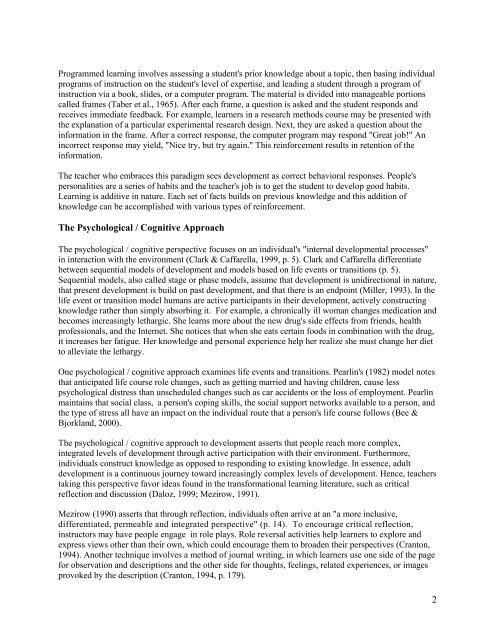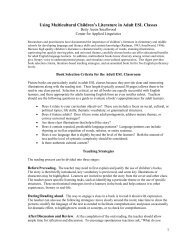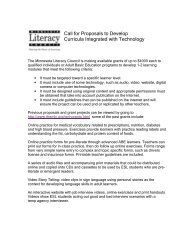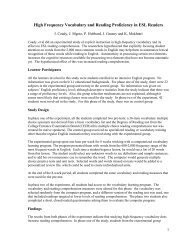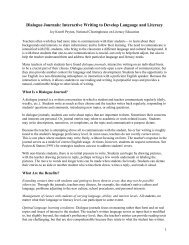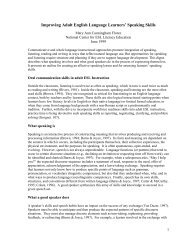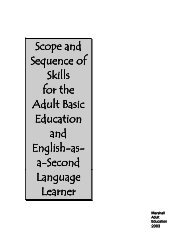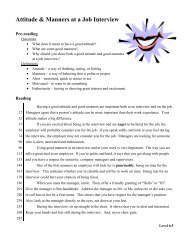Four Adult Development Theories and Their Implications for Practice
Four Adult Development Theories and Their Implications for Practice
Four Adult Development Theories and Their Implications for Practice
Create successful ePaper yourself
Turn your PDF publications into a flip-book with our unique Google optimized e-Paper software.
Programmed learning involves assessing a student's prior knowledge about a topic, then basing individual<br />
programs of instruction on the student's level of expertise, <strong>and</strong> leading a student through a program of<br />
instruction via a book, slides, or a computer program. The material is divided into manageable portions<br />
called frames (Taber et al., 1965). After each frame, a question is asked <strong>and</strong> the student responds <strong>and</strong><br />
receives immediate feedback. For example, learners in a research methods course may be presented with<br />
the explanation of a particular experimental research design. Next, they are asked a question about the<br />
in<strong>for</strong>mation in the frame. After a correct response, the computer program may respond "Great job!" An<br />
incorrect response may yield, "Nice try, but try again." This rein<strong>for</strong>cement results in retention of the<br />
in<strong>for</strong>mation.<br />
The teacher who embraces this paradigm sees development as correct behavioral responses. People's<br />
personalities are a series of habits <strong>and</strong> the teacher's job is to get the student to develop good habits.<br />
Learning is additive in nature. Each set of facts builds on previous knowledge <strong>and</strong> this addition of<br />
knowledge can be accomplished with various types of rein<strong>for</strong>cement.<br />
The Psychological / Cognitive Approach<br />
The psychological / cognitive perspective focuses on an individual's "internal developmental processes"<br />
in interaction with the environment (Clark & Caffarella, 1999, p. 5). Clark <strong>and</strong> Caffarella differentiate<br />
between sequential models of development <strong>and</strong> models based on life events or transitions (p. 5).<br />
Sequential models, also called stage or phase models, assume that development is unidirectional in nature,<br />
that present development is build on past development, <strong>and</strong> that there is an endpoint (Miller, 1993). In the<br />
life event or transition model humans are active participants in their development, actively constructing<br />
knowledge rather than simply absorbing it. For example, a chronically ill woman changes medication <strong>and</strong><br />
becomes increasingly lethargic. She learns more about the new drug's side effects from friends, health<br />
professionals, <strong>and</strong> the Internet. She notices that when she eats certain foods in combination with the drug,<br />
it increases her fatigue. Her knowledge <strong>and</strong> personal experience help her realize she must change her diet<br />
to alleviate the lethargy.<br />
One psychological / cognitive approach examines life events <strong>and</strong> transitions. Pearlin's (1982) model notes<br />
that anticipated life course role changes, such as getting married <strong>and</strong> having children, cause less<br />
psychological distress than unscheduled changes such as car accidents or the loss of employment. Pearlin<br />
maintains that social class, a person's coping skills, the social support networks available to a person, <strong>and</strong><br />
the type of stress all have an impact on the individual route that a person's life course follows (Bee &<br />
Bjorkl<strong>and</strong>, 2000).<br />
The psychological / cognitive approach to development asserts that people reach more complex,<br />
integrated levels of development through active participation with their environment. Furthermore,<br />
individuals construct knowledge as opposed to responding to existing knowledge. In essence, adult<br />
development is a continuous journey toward increasingly complex levels of development. Hence, teachers<br />
taking this perspective favor ideas found in the trans<strong>for</strong>mational learning literature, such as critical<br />
reflection <strong>and</strong> discussion (Daloz, 1999; Mezirow, 1991).<br />
Mezirow (1990) asserts that through reflection, individuals often arrive at an "a more inclusive,<br />
differentiated, permeable <strong>and</strong> integrated perspective" (p. 14). To encourage critical reflection,<br />
instructors may have people engage in role plays. Role reversal activities help learners to explore <strong>and</strong><br />
express views other than their own, which could encourage them to broaden their perspectives (Cranton,<br />
1994). Another technique involves a method of journal writing, in which learners use one side of the page<br />
<strong>for</strong> observation <strong>and</strong> descriptions <strong>and</strong> the other side <strong>for</strong> thoughts, feelings, related experiences, or images<br />
provoked by the description (Cranton, 1994, p. 179).<br />
2


